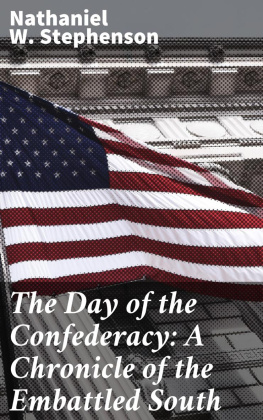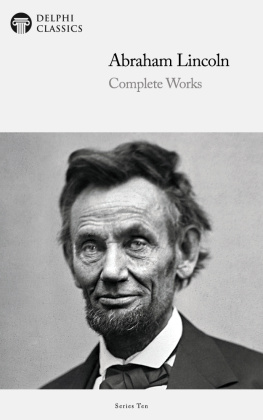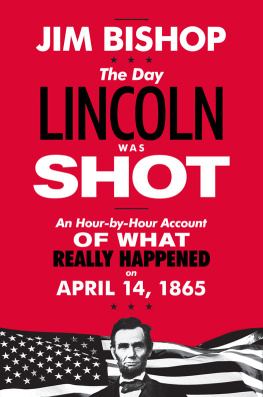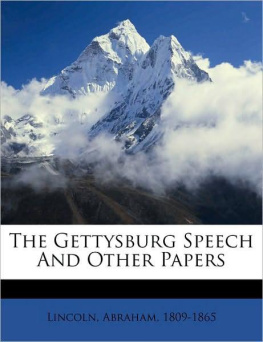PREFACE
Table of Contents
In spite of a lapse of sixty years, the historian who attempts to portray the era of Lincoln is still faced with almost impossible demands and still confronted with arbitrary points of view. It is out of the question, in a book so brief as this must necessarily be, to meet all these demands or to alter these points of view. Interests that are purely local, events that did not with certainty contribute to the final outcome, gossip, as well as the mere caprice of the scholarthese must obviously be set aside.
The task imposed upon the volume resolves itself, at bottom, into just two questions: Why was there a war? Why was the Lincoln Government successful? With these two questions always in mind I have endeavored, on the one hand, to select and consolidate the pertinent facts; on the other, to make clear, even at the cost of explanatory comment, their relations in the historical sequence of cause and effect. This purpose has particularly governed the use of biographical matter, in which the main illustration, of course, is the career of Lincoln. Prominent as it is here made, the Lincoln matter all bears in the last analysis on one pointhis control of his support. On that the history of the North hinges. The personal and private Lincoln it is impossible to present within these pages. The public Lincoln, including the character of his mind, is here the essential matter.
The bibliography at the close of the volume indicates the more important books which are at the reader's disposal and which it is unfortunate not to know.
NATHANIEL W. STEPHENSON. Charleston, S. C., March, 1918.
CHAPTER I. THE TWO NATIONS OF THE REPUBLIC
Table of Contents
"There is really no Union now between the North and the South. No two nations upon earth entertain feelings of more bitter rancor toward each other than these two nations of the Republic."
This remark, which is attributed to Senator Benjamin Wade of Ohio, provides the key to American politics in the decade following the Compromise of 1850. To trace this division of the people to its ultimate source, one would have to go far back into colonial times. There was a process of natural selection at work, in the intellectual and economic conditions of the eighteenth century, which inevitably drew together certain types and generated certain forces. This process manifested itself in one form in His Majesty's plantations of the North, and in another in those of the South. As early as the opening of the nineteenth century, the social tendencies of the two regions were already so far alienated that they involved differences which would scarcely admit of reconciliation. It is a truism to say that these differences gradually were concentrated around fundamentally different conceptions of laborof slave labor in the South, of free labor in the North.
Nothing, however, could be more fallacious than the notion that this growing antagonism was controlled by any deliberate purpose in either part of the country. It was apparently necessary that this Republic in its evolution should proceed from confederation to nationality through an intermediate and apparently reactionary period of sectionalism. In this stage of American history, slavery was without doubt one of the prime factors involved, but sectional consciousness, with all its emotional and psychological implications, was the fundamental impulse of the stern events which occurred between 1850 and 1865.
By the middle of the nineteenth century the more influential Southerners had come generally to regard their section of the country as a distinct social unit. The next step was inevitable. The South began to regard itself as a separate political unit. It is the distinction of Calhoun that he showed himself toward the end sufficiently flexible to become the exponent of this new political impulse. With all his earlier fire he encouraged the Southerners to withdraw from the so-called national parties, Whig and Democratic, to establish instead a single Southern party, and to formulate, by means of popular conventions, a single concerted policy for the entire South.
At that time such a policy was still regarded, from the Southern point of view, as a radical idea. In 1851, a battle was fought at the polls between the two Southern ideasthe old one which upheld separate state independence, and the new one which virtually acknowledged Southern nationality. The issue at stake was the acceptance or the rejection of a compromise which could bring no permanent settlement of fundamental differences.
Nowhere was the battle more interesting than in South Carolina, for it brought into clear light that powerful Southern leader who ten years later was to be the masterspirit of secessionRobert Barnwell Rhett. In 1851 he fought hard to revive the older idea of state independence and to carry South Carolina as a separate state out of the Union. Accordingly it is significant of the progress that the consolidation of the South had made at this date that on this issue Rhett encountered general opposition. This difference of opinion as to policy was not inspired, as some historians have too hastily concluded, by national feeling. Scarcely any of the leaders of the opposition considered the Federal Government supreme over the State Government. They opposed Rhett because they felt secession to be at that moment bad policy. They saw that, if South Carolina went out of the Union in 1851, she would go alone and the solidarity of the South would be broken. They were not lacking in sectional patriotism, but their conception of the best solution of the complex problem differed from that advocated by Rhett. Their position was summed up by Langdon Cheves when he said, "To secede now is to secede from the South as well as from the Union." On the basis of this belief they defeated Rhett and put off secession for ten years.
There is no analogous single event in the history of the North, previous to the war, which reveals with similar clearness a sectional consciousness. On the surface the life of the people seemed, indeed, to belie the existence of any such feeling. The Northern capitalist class aimed steadily at being non-sectional, and it made free use of the word national. We must not forget, however, that all sorts of people talked of national institutions, and that the term, until we look closely into the mind of, the person using it, signifies nothing. Because the Northern capitalist repudiated the idea of sectionalism, it does not follow that he set up any other in its place. Instead of accomplishing anything so positive, he remained for the most part a negative quantity.
Living usually somewhere between Maine and Ohio, he made it his chief purpose to regulate the outflow of manufactures from that industrial region and the inflow of agricultural produce. The movement of the latter eastward and northward, and the former westward and southward, represents roughly but graphically the movement of the business of that time. The Easterner lived in fear of losing the money which was owed him in the South. As the political and economic conditions of the day made unlikely any serious clash of interest between the East and the West, he had little solicitude about his accounts beyond the Alleghanies. But a gradually developing hostility between North and South was accompanied by a parallel anxiety on the part of Northern capital for its Southern investments and debts. When the war eventually became inevitable, $200,000,000 were owed by Southerners to Northerners. For those days this was an indebtedness of no inconsiderable magnitude. The Northern capitalists, preoccupied with their desire to secure this account, were naturally eager to repudiate sectionalism, and talked about national interests with a zeal that has sometimes been misinterpreted. Throughout the entire period from 1850 to 1865, capital in American politics played for the most part a negative role, and not until after the war did it become independent of its Southern interests.














